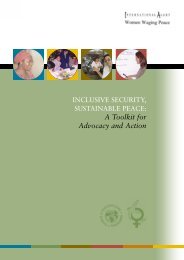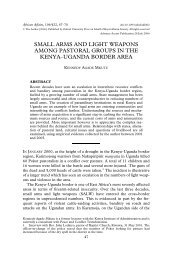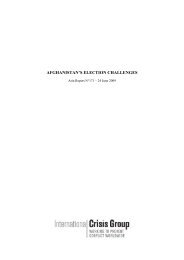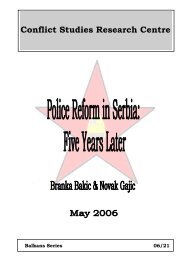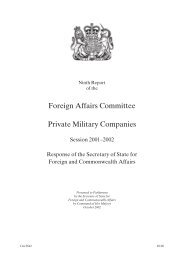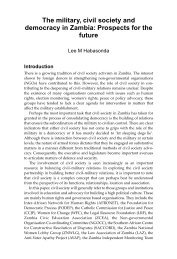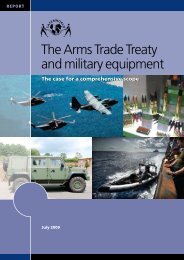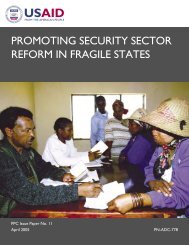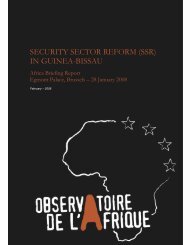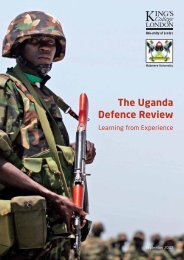The role of civil society in conflict prevention: West African experiences
The role of civil society in conflict prevention: West African experiences
The role of civil society in conflict prevention: West African experiences
Create successful ePaper yourself
Turn your PDF publications into a flip-book with our unique Google optimized e-Paper software.
<strong>The</strong> <strong>role</strong> <strong>of</strong> <strong>civil</strong> <strong>society</strong> <strong>in</strong> <strong>conflict</strong> <strong>prevention</strong>:<br />
<strong>West</strong> <strong>African</strong> <strong>experiences</strong><br />
<strong>The</strong>lma Ek i y o r<br />
Civil <strong>society</strong>’s visibility and <strong>in</strong>fluence <strong>in</strong> <strong>conflict</strong> <strong>prevention</strong> and peacebuild<strong>in</strong>g has grown<br />
globally. Civil <strong>society</strong> actors have <strong>in</strong>creas<strong>in</strong>gly become vital forces <strong>in</strong> discourses, <strong>in</strong>itiatives<br />
and programmes that foster peace and security across the world. Specifically, <strong>civil</strong> <strong>society</strong> has<br />
been <strong>in</strong>strumental <strong>in</strong> the reconceptualization <strong>of</strong> security from a “state-centred” process to one that is<br />
“people centred”. This focus on people-centred security emanates from the belief that fundamentally<br />
the susta<strong>in</strong>able security <strong>of</strong> states can only be atta<strong>in</strong>ed through the security <strong>of</strong> its people. This belief is<br />
shared <strong>in</strong> regions across the world that have experienced open <strong>conflict</strong>s and <strong>civil</strong> wars, which have<br />
ravaged communities and brought devastation to the lives <strong>of</strong> ord<strong>in</strong>ary people.<br />
<strong>West</strong> Africa has witnessed a number <strong>of</strong> protracted <strong>civil</strong> wars and <strong>in</strong>tra-state <strong>conflict</strong>s. <strong>The</strong>se<br />
<strong>conflict</strong>s have resulted <strong>in</strong> millions <strong>of</strong> deaths, the displacement <strong>of</strong> communities, proliferation <strong>of</strong> small<br />
arms and light weapons (SALW), and the stagnation <strong>of</strong> growth and development <strong>in</strong> the region. <strong>The</strong><br />
nature <strong>of</strong> these <strong>conflict</strong>s exposes and draws <strong>in</strong> local populations: <strong>West</strong> <strong>African</strong> <strong>conflict</strong>s are <strong>in</strong>tricate,<br />
multifaceted and multi-party, and as a result it is impossible for state actors to prevent, manage or<br />
resolve them without the assistance and <strong>in</strong>volvement <strong>of</strong> non-state actors.<br />
Civil <strong>society</strong> <strong>in</strong> particular has been at the forefront <strong>of</strong> promot<strong>in</strong>g localized peacebuild<strong>in</strong>g<br />
<strong>in</strong>itiatives, <strong>in</strong>itiat<strong>in</strong>g reconciliation processes, advocat<strong>in</strong>g for adherence to peace agreements and<br />
build<strong>in</strong>g capacities <strong>in</strong> peace education. In spite <strong>of</strong> play<strong>in</strong>g such laudable <strong>role</strong>s, however, <strong>civil</strong> <strong>society</strong><br />
still faces a number <strong>of</strong> challenges, rang<strong>in</strong>g from poor organization among actors with<strong>in</strong> the sector,<br />
poor fund<strong>in</strong>g for activities, governments’ mistrust and the <strong>of</strong>ten antagonistic <strong>in</strong>teraction between <strong>civil</strong><br />
<strong>society</strong> and government. This article exam<strong>in</strong>es the various contributions <strong>civil</strong> <strong>society</strong> organizations<br />
(CSOs) have made to <strong>conflict</strong> <strong>prevention</strong> <strong>in</strong> <strong>West</strong> Africa.<br />
What is <strong>civil</strong> <strong>society</strong>?<br />
Def<strong>in</strong><strong>in</strong>g <strong>civil</strong> <strong>society</strong> and identify<strong>in</strong>g which organizations fall with<strong>in</strong> the framework <strong>of</strong> <strong>civil</strong> <strong>society</strong><br />
cont<strong>in</strong>ues to be a challenge. <strong>The</strong> difficulty <strong>of</strong> conceptualiz<strong>in</strong>g <strong>civil</strong> <strong>society</strong> <strong>in</strong> <strong>West</strong> Africa is that there<br />
is a tendency to focus on non-governmental organizations (NGOs), exclud<strong>in</strong>g groups and associations<br />
that reflect <strong>West</strong> Africa’s associational culture, e.g. traditional governance structures.<br />
<strong>The</strong> Economic, Social and Cultural Council (ECOSOCC) <strong>of</strong> the <strong>African</strong> Union def<strong>in</strong>es <strong>civil</strong> <strong>society</strong><br />
as compris<strong>in</strong>g social groups; pr<strong>of</strong>essional groups; NGOs, community-based organizations (CBOs),<br />
voluntary organizations; and cultural organizations, among other segments <strong>in</strong> which women, youth,<br />
<strong>The</strong>lma Ekiyor is Director <strong>of</strong> the <strong>West</strong> Africa Civil Society Institute, Accra, Ghana.
four • 2008<br />
<strong>The</strong> complex dynamics <strong>of</strong> small arms <strong>in</strong> <strong>West</strong> Africa<br />
children, national diasporas and elements <strong>of</strong> the private sector such as market women’s associations<br />
and the media are listed. 1<br />
Civil <strong>society</strong> has also been described as the arena outside the family, the state and the market,<br />
where people associate to advance common <strong>in</strong>terests. 2 <strong>The</strong> notion <strong>of</strong> an arena where people associate<br />
to advance common <strong>in</strong>terests has strong resonance <strong>in</strong> <strong>West</strong> Africa as it enables the def<strong>in</strong>ition <strong>of</strong> <strong>civil</strong><br />
<strong>society</strong> to <strong>in</strong>clude formal and <strong>in</strong>formal group<strong>in</strong>gs such as traditional chiefs, Queen Mother associations,<br />
youth movements, market women, religious groups and the media.<br />
What is <strong>conflict</strong> <strong>prevention</strong>?<br />
Analogous to <strong>civil</strong> <strong>society</strong>, <strong>conflict</strong> <strong>prevention</strong> presents def<strong>in</strong>itional challenges. It rema<strong>in</strong>s an ambiguous<br />
concept that has transformed over time. <strong>The</strong> former UN Secretary-General Boutros Boutros-Ghali<br />
described <strong>conflict</strong> <strong>prevention</strong> as preventive diplomacy, an “action to prevent disputes from aris<strong>in</strong>g<br />
between parties, to prevent exist<strong>in</strong>g disputes from escalat<strong>in</strong>g <strong>in</strong>to <strong>conflict</strong>s and limit the spread <strong>of</strong> the<br />
latter when they occur”. 3<br />
In <strong>West</strong> Africa, the Economic Community <strong>of</strong> <strong>West</strong> <strong>African</strong> States’ (ECOWAS) Conflict Prevention<br />
Framework (ECPF) def<strong>in</strong>es <strong>conflict</strong> <strong>prevention</strong> as:<br />
activities designed to reduce tensions and prevent the outbreak, escalation, spread or<br />
recurrence <strong>of</strong> violence. Conflict <strong>prevention</strong> strategies may dist<strong>in</strong>guish between operational<br />
<strong>prevention</strong> (measures applicable <strong>in</strong> the face <strong>of</strong> imm<strong>in</strong>ent crisis) and structural <strong>prevention</strong><br />
(measures to ensure that crises do not arise <strong>in</strong> the first place or, if they do, that they do<br />
not re-occur). <strong>The</strong> emphasis is not on prevent<strong>in</strong>g <strong>conflict</strong> per se (<strong>conflict</strong> be<strong>in</strong>g a natural<br />
consequence <strong>of</strong> change) but <strong>in</strong> halt<strong>in</strong>g its descent <strong>in</strong>to violence. 4<br />
Civil <strong>society</strong>’s <strong>in</strong>volvement <strong>in</strong> <strong>conflict</strong> <strong>prevention</strong> <strong>in</strong> the region corresponds with this def<strong>in</strong>ition;<br />
it has contributed to structural and operational <strong>prevention</strong> <strong>in</strong> a variety <strong>of</strong> ways.<br />
Civil <strong>society</strong> and <strong>conflict</strong> <strong>prevention</strong><br />
CSOs <strong>in</strong> Africa have a strong history <strong>of</strong> be<strong>in</strong>g at the forefront <strong>of</strong> movements that dislodged entrenched<br />
authoritarianism to <strong>in</strong>troduce democratic governance on the <strong>African</strong> cont<strong>in</strong>ent. In <strong>West</strong> Africa, <strong>civil</strong><br />
<strong>society</strong>, through trade and student unions, women’s groups and pr<strong>of</strong>essional associations, was active<br />
<strong>in</strong> the struggles for <strong>in</strong>dependence. As the political context <strong>in</strong> different <strong>West</strong> <strong>African</strong> countries evolved<br />
from the post-<strong>in</strong>dependence era to military and autocratic rule, to current endeavours to build<br />
democratic states, the <strong>role</strong> <strong>of</strong> <strong>civil</strong> <strong>society</strong> also evolved. CSOs across <strong>West</strong> Africa have been important<br />
catalysts for end<strong>in</strong>g military dictatorship, advocat<strong>in</strong>g for pluralist and open societies, and promulgat<strong>in</strong>g<br />
democratization and good governance.<br />
Civil <strong>society</strong> actors have also filled a vital <strong>role</strong> as primary providers <strong>of</strong> basic social services <strong>in</strong> wartorn<br />
societies where viable public <strong>in</strong>stitutions and state apparatus are non-existent or considerably<br />
weakened. In these anarchical environments, CSOs have become important actors <strong>in</strong> the processes<br />
<strong>of</strong> mitigat<strong>in</strong>g <strong>conflict</strong> and build<strong>in</strong>g peace. It has to be acknowledged, however, that <strong>civil</strong> <strong>society</strong> is not<br />
a homogeneous group, therefore it cannot be said that all CSOs are by def<strong>in</strong>ition peacebuilders. In<br />
countries like Côte d’Ivoire, Gu<strong>in</strong>ea-Bissau, Liberia and Sierra Leone, some CSOs have been accused<br />
<strong>of</strong> align<strong>in</strong>g themselves with warr<strong>in</strong>g factions and assum<strong>in</strong>g political positions <strong>in</strong> the <strong>conflict</strong>. However,<br />
this does not dim<strong>in</strong>ish the positive contributions other CSOs have made <strong>in</strong> promot<strong>in</strong>g peace and<br />
prevent<strong>in</strong>g <strong>conflict</strong>. In both latent and open <strong>conflict</strong> situations, <strong>civil</strong> <strong>society</strong> has been key <strong>in</strong> address<strong>in</strong>g<br />
socio-economic disparities <strong>in</strong> <strong>society</strong>; assist<strong>in</strong>g with humanitarian relief; promot<strong>in</strong>g human and<br />
28
<strong>The</strong> <strong>role</strong> <strong>of</strong> <strong>civil</strong> <strong>society</strong> <strong>in</strong> <strong>conflict</strong> <strong>prevention</strong>: <strong>West</strong> <strong>African</strong> <strong>experiences</strong> four • 2008<br />
women’s rights; and contribut<strong>in</strong>g toward strengthen<strong>in</strong>g government organs like the judiciary and the<br />
security sector. Furthermore, <strong>civil</strong> <strong>society</strong>’s proximity to local populations has also made it critical to<br />
mediation, reconciliation and other community peacebuild<strong>in</strong>g <strong>in</strong>itiatives.<br />
Practical contributions <strong>of</strong> <strong>civil</strong> <strong>society</strong> to prevent<strong>in</strong>g <strong>conflict</strong><br />
Civil <strong>society</strong> <strong>in</strong> <strong>West</strong> Africa has played key <strong>role</strong>s <strong>in</strong> prevent<strong>in</strong>g violent <strong>conflict</strong> <strong>in</strong> a number <strong>of</strong> ways.<br />
<strong>The</strong>se <strong>in</strong>clude be<strong>in</strong>g <strong>in</strong>volved <strong>in</strong> early warn<strong>in</strong>g and response, advocat<strong>in</strong>g aga<strong>in</strong>st the proliferation<br />
<strong>of</strong> small arms, ensur<strong>in</strong>g that peace processes yield <strong>in</strong>clusive agreements, contribut<strong>in</strong>g toward post<strong>conflict</strong><br />
reconstruction, and promot<strong>in</strong>g the <strong>in</strong>volvement <strong>of</strong> women <strong>in</strong> peacebuild<strong>in</strong>g.<br />
Central to successful peacebuild<strong>in</strong>g is local ownership and the engagement <strong>of</strong> local actors <strong>in</strong> the<br />
development and implementation <strong>of</strong> peacebuild<strong>in</strong>g strategies. CSOs represent important resources <strong>of</strong><br />
local knowledge and expertise and are uniquely equipped to mobilize <strong>in</strong>dividuals <strong>in</strong> peacebuild<strong>in</strong>g<br />
activities. In many <strong>in</strong>stances, CBOs drive community harmonization and assist <strong>in</strong> rebuild<strong>in</strong>g relationships<br />
<strong>in</strong> post-<strong>conflict</strong> situations.<br />
It is difficult to capture <strong>in</strong> this article the entirety <strong>of</strong> CSOs’ contributions to <strong>conflict</strong> <strong>prevention</strong> <strong>in</strong><br />
<strong>West</strong> Africa. However, the follow<strong>in</strong>g practical examples <strong>of</strong> CSOs’ <strong>in</strong>terventions <strong>in</strong> <strong>conflict</strong> will provide<br />
an <strong>in</strong>sight <strong>in</strong>to the extent <strong>of</strong> their <strong>in</strong>put, both formal and <strong>in</strong>formal.<br />
Civil so c i e t y an d ea r ly w a r n i n g<br />
Conflict early warn<strong>in</strong>g and response has been described as the s<strong>in</strong>e qua non <strong>of</strong> <strong>conflict</strong> <strong>prevention</strong>.<br />
It consists <strong>of</strong> the systematic collection and analysis <strong>of</strong> <strong>in</strong>formation com<strong>in</strong>g from areas <strong>of</strong> crisis for the<br />
purposes <strong>of</strong> anticipat<strong>in</strong>g the escalation <strong>of</strong> violent <strong>conflict</strong>, develop<strong>in</strong>g strategic responses to crises, and<br />
the presentation <strong>of</strong> options to critical actors for decision-mak<strong>in</strong>g.<br />
<strong>The</strong> development <strong>of</strong> early warn<strong>in</strong>g systems has ga<strong>in</strong>ed popularity across Africa, and the <strong>African</strong><br />
Union and its Regional Economic Communities are all at different stages <strong>of</strong> develop<strong>in</strong>g <strong>in</strong>stitutionalized<br />
systems. In <strong>West</strong> Africa, CSOs have played pivotal <strong>role</strong>s <strong>in</strong> the development <strong>of</strong> the region’s framework<br />
for <strong>conflict</strong> early and response. For example, the <strong>West</strong> Africa Network for Peacebuild<strong>in</strong>g (WANEP)<br />
has been <strong>in</strong>strumental <strong>in</strong> “on the ground” <strong>conflict</strong> monitor<strong>in</strong>g as part <strong>of</strong> the ECOWAS Early Warn<strong>in</strong>g<br />
and Response Network (ECOWARN). ECOWAS realized that it lacked the <strong>in</strong>stitutional and technical<br />
capacity to implement an early warn<strong>in</strong>g system, which was a central component <strong>of</strong> its <strong>conflict</strong> <strong>prevention</strong><br />
mechanism. WANEP capitalized on this opportunity to fill the vacuum by utiliz<strong>in</strong>g its networks to<br />
develop a grass-roots early warn<strong>in</strong>g system that passes <strong>in</strong>formation to the ECOWAS mechanism. This<br />
grass-roots network is the critical web that feeds <strong>in</strong>to four zonal bureaus and the Observation and<br />
Monitor<strong>in</strong>g Centre at the ECOWAS Secretariat <strong>in</strong> Abuja, Nigeria. Through WANEP, <strong>civil</strong> <strong>society</strong> is thus<br />
<strong>in</strong>volved <strong>in</strong> filter<strong>in</strong>g, monitor<strong>in</strong>g and analys<strong>in</strong>g <strong>conflict</strong> <strong>in</strong>formation at the community and national<br />
levels.<br />
This experience <strong>of</strong> collaboration between WANEP and ECOWAS has been highlighted as a best<br />
practice <strong>of</strong> how to build alliances with <strong>civil</strong> <strong>society</strong> <strong>in</strong> operationaliz<strong>in</strong>g early warn<strong>in</strong>g systems and is<br />
be<strong>in</strong>g exam<strong>in</strong>ed by other subregions <strong>in</strong> Africa that are <strong>in</strong> the prelim<strong>in</strong>ary stages <strong>of</strong> develop<strong>in</strong>g early<br />
warn<strong>in</strong>g systems, such as the Economic Community <strong>of</strong> Central <strong>African</strong> States.<br />
Civil so c i e t y an d small ar m s an d li g h t we a p o n s<br />
<strong>The</strong> scale <strong>of</strong> the proliferation <strong>of</strong> SALW <strong>in</strong> <strong>West</strong> Africa is a major security concern. It is estimated that <strong>of</strong><br />
the 639 million SALW circulat<strong>in</strong>g globally, 7 million are <strong>in</strong> <strong>West</strong> Africa. 5 Small arms are easily available<br />
29
four • 2008<br />
<strong>The</strong> complex dynamics <strong>of</strong> small arms <strong>in</strong> <strong>West</strong> Africa<br />
<strong>in</strong> the region and with the <strong>in</strong>termittent eruptions <strong>of</strong> <strong>conflict</strong>, the local arms manufactur<strong>in</strong>g <strong>in</strong>dustry is<br />
thriv<strong>in</strong>g.<br />
This dire situation has led many CSOs <strong>in</strong> the region to focus their energies on advocat<strong>in</strong>g aga<strong>in</strong>st<br />
the proliferation <strong>of</strong> arms. <strong>The</strong> collective advocacy efforts <strong>of</strong> CSOs through <strong>in</strong>itiatives like the <strong>West</strong><br />
Africa Action Network on Small Arms (WAANSA) have yielded constructive outcomes <strong>in</strong> the region.<br />
For example, CSOs were at the forefront <strong>of</strong> the process call<strong>in</strong>g for an ECOWAS convention on SALW.<br />
On 14 June 2006, the Conference <strong>of</strong> ECOWAS Heads <strong>of</strong> State and Government signed the ECOWAS<br />
Convention on Small Arms and Light Weapons, <strong>The</strong>ir Ammunition and Other Related Materials. (This<br />
convention was pre-dated by the Declaration on the Moratorium on the Importation, Exportation<br />
and Manufacture <strong>of</strong> Light Weapons <strong>in</strong> ECOWAS member states, which was signed on 31 October<br />
1998.) 6<br />
CSOs also work at the national level to raise awareness <strong>of</strong> the dangers <strong>of</strong> arms production, and<br />
the ease with which arms can be smuggled across porous national borders. In Ghana, the Foundation<br />
for Security and Development <strong>in</strong> Africa (FOSDA) has gone further by donat<strong>in</strong>g metal detectors to<br />
the Ghana Police Service <strong>in</strong> the Northern Region to help track down illicit arms and ammunitions.<br />
In Senegal, <strong>civil</strong> <strong>society</strong> has been particularly active <strong>in</strong> the fight aga<strong>in</strong>st the SALW proliferation. <strong>The</strong><br />
Mouvement contre les Armes Légères (MALAO) is one <strong>of</strong> the ma<strong>in</strong> organizations that focuses on<br />
communication and awareness-rais<strong>in</strong>g strategies, education and research. MALAO also works <strong>in</strong><br />
<strong>The</strong>re can be no doubt<br />
that the level <strong>of</strong> awareness and<br />
the success <strong>in</strong> policy change<br />
on SALW <strong>in</strong> <strong>West</strong> Africa is<br />
attributable to <strong>civil</strong> <strong>society</strong>.<br />
partnership with the Senegalese National Commission (responsible for<br />
controll<strong>in</strong>g the proliferation <strong>of</strong> small arms) and has <strong>in</strong>itiated numerous<br />
sensitization, lobby<strong>in</strong>g and tra<strong>in</strong><strong>in</strong>g activities.<br />
<strong>The</strong>re can be no doubt that the level <strong>of</strong> awareness and the success<br />
<strong>in</strong> policy change on SALW <strong>in</strong> <strong>West</strong> Africa is attributable to <strong>civil</strong> <strong>society</strong>.<br />
Advocacy <strong>in</strong> this area cont<strong>in</strong>ues, but already the <strong>in</strong>delible contribution <strong>of</strong><br />
CSOs <strong>in</strong> br<strong>in</strong>g<strong>in</strong>g this security challenge to the public doma<strong>in</strong> has ensured that policy makers will not<br />
ignore the present and future dangers <strong>of</strong> the spread and proliferation <strong>of</strong> arms.<br />
Civil so c i e t y an d pe a c e ta l k s<br />
<strong>The</strong> <strong>in</strong>clusion <strong>of</strong> <strong>civil</strong> <strong>society</strong> <strong>in</strong> peace processes <strong>in</strong> <strong>West</strong> Africa has evolved with each process. Delegates<br />
and participants at peace processes <strong>in</strong> the 1990s were limited to warr<strong>in</strong>g factions and political parties,<br />
with <strong>in</strong>ternational observers and representatives <strong>of</strong> <strong>in</strong>tergovernmental organizations such as ECOWAS,<br />
the <strong>African</strong> Union and the United Nations.<br />
However, the protracted nature <strong>of</strong> the <strong>civil</strong> <strong>conflict</strong>s <strong>in</strong> countries like Liberia and Sierra Leone<br />
meant that peace talks came to represent desperate opportunities to br<strong>in</strong>g stability to countries. <strong>The</strong><br />
<strong>in</strong>ability <strong>of</strong> the warr<strong>in</strong>g factions to reach susta<strong>in</strong>able and implementable agreements, for example<br />
the failures <strong>of</strong> the Abidjan Peace Accord <strong>of</strong> 1996 and the Conakry Peace Plan <strong>of</strong> 1997 (both on<br />
Sierra Leone) led many <strong>civil</strong> <strong>society</strong> actors to <strong>in</strong>ject themselves <strong>in</strong>to subsequent talks. Civil <strong>society</strong><br />
actors argued that the voices and needs <strong>of</strong> ord<strong>in</strong>ary citizens needed to be heard and discussed at<br />
the peace table. CSOs’ expertise, skills and capacities were useful <strong>in</strong> creat<strong>in</strong>g the right conditions for<br />
talks, build<strong>in</strong>g confidence between parties, shap<strong>in</strong>g the conduct and content <strong>of</strong> negotiations, and<br />
<strong>in</strong>fluenc<strong>in</strong>g the susta<strong>in</strong>ability <strong>of</strong> peace agreements. Groups like the Inter-Religious Council <strong>of</strong> Liberia<br />
and <strong>of</strong> Sierra Leone, the Mano River Women’s Peace Network (MARWOPNET) and the Women <strong>in</strong><br />
Peacebuild<strong>in</strong>g Network (WIPNET) have been critical to ensur<strong>in</strong>g that warr<strong>in</strong>g factions come to the<br />
negotiat<strong>in</strong>g table and that the agreements reached reflect the needs <strong>of</strong> the people. Dur<strong>in</strong>g the actual<br />
peace talks, these CSOs have engaged <strong>in</strong> beh<strong>in</strong>d-the-scenes diplomacy, urg<strong>in</strong>g compromise and <strong>in</strong><br />
many cases build<strong>in</strong>g trust between the parties. After peace agreements have been signed, CSOs have<br />
30
<strong>The</strong> <strong>role</strong> <strong>of</strong> <strong>civil</strong> <strong>society</strong> <strong>in</strong> <strong>conflict</strong> <strong>prevention</strong>: <strong>West</strong> <strong>African</strong> <strong>experiences</strong> four • 2008<br />
played a public service <strong>role</strong> by educat<strong>in</strong>g citizens <strong>in</strong> the terms <strong>of</strong> the agreement and <strong>in</strong> strategies for<br />
hold<strong>in</strong>g leaders accountable.<br />
<strong>The</strong> success <strong>of</strong> <strong>civil</strong> <strong>society</strong>’s <strong>in</strong>volvement <strong>in</strong> these peace talks stresses that peace processes are<br />
not purely political and military endeavours. CSOs’ ability to <strong>in</strong>fluence the talks and their outcomes<br />
buttresses the argument that the needs, aspirations and concerns <strong>of</strong> people directly affected by the<br />
violence are <strong>in</strong>tegral to the negotiation process.<br />
Civil so c i e t y an d po s t -co n f l i c t re c o n s t r u c t i o n<br />
When the <strong>conflict</strong> is over, <strong>civil</strong> <strong>society</strong> still plays important <strong>role</strong>s, and CSOs are <strong>of</strong>ten a strong factor<br />
<strong>in</strong> ensur<strong>in</strong>g peaceful transitions to democratically elected governments. Specialized CSOs have<br />
the capacity to promote reconciliation, enhance local ownership <strong>of</strong> peacebuild<strong>in</strong>g <strong>in</strong>itiatives and<br />
contribute toward democratization processes. Civil <strong>society</strong> has been pivotal to the transitional justice<br />
processes that have occurred <strong>in</strong> Liberia and Sierra Leone. CSOs played crucial <strong>role</strong>s <strong>in</strong> establish<strong>in</strong>g<br />
Truth and Reconciliation Commissions (TRCs) <strong>in</strong> both countries and were key to retributive justice<br />
proceed<strong>in</strong>gs <strong>in</strong> the Special Court for Sierra Leone.<br />
In Sierra Leone and now Liberia, <strong>civil</strong> <strong>society</strong> was and is <strong>in</strong>strumental <strong>in</strong> rais<strong>in</strong>g awareness <strong>of</strong><br />
the TRCs, keep<strong>in</strong>g the public updated on proceed<strong>in</strong>gs, document<strong>in</strong>g <strong>experiences</strong> and expos<strong>in</strong>g any<br />
deficiencies <strong>in</strong> the process such as <strong>in</strong>adequate procedures for tak<strong>in</strong>g statements, lack <strong>of</strong> <strong>in</strong>itiatives to<br />
protect witnesses testify<strong>in</strong>g about rape and similar crimes, and low levels <strong>of</strong> citizen representation <strong>in</strong><br />
the process. In the case <strong>of</strong> Sierra Leone, CSOs are lead<strong>in</strong>g the calls for implementation <strong>of</strong> the TRC<br />
recommendations.<br />
Civil <strong>society</strong> is also actively <strong>in</strong>volved <strong>in</strong> <strong>in</strong>itiatives to reform the security sector <strong>in</strong> these countries.<br />
It can also be credited with assist<strong>in</strong>g with socio-economic recovery programmes such as poverty<br />
reduction strategies, youth employment and women’s micr<strong>of</strong><strong>in</strong>ance projects, which are crucial to<br />
rebuild<strong>in</strong>g economies decimated by the wars.<br />
Wom e n ’s ro l e <strong>in</strong> co n f l i c t <strong>prevention</strong><br />
F<strong>in</strong>ally, the impact <strong>of</strong> wars on women both as victims and perpetrators has meant that the tactics <strong>of</strong><br />
women as peacebuilders have also had to change, from hold<strong>in</strong>g less visible <strong>role</strong>s to assum<strong>in</strong>g more<br />
strategic and <strong>in</strong>fluential <strong>role</strong>s. As <strong>West</strong> <strong>African</strong> states became militarized, women became less relevant<br />
<strong>in</strong> formal peacebuild<strong>in</strong>g. Peacebuild<strong>in</strong>g <strong>in</strong>itiatives were designed by men, mak<strong>in</strong>g the <strong>role</strong> <strong>of</strong> women<br />
<strong>in</strong> promot<strong>in</strong>g peace unclear and uncerta<strong>in</strong>. However, at the peak <strong>of</strong> the violence <strong>in</strong> Liberia and<br />
Sierra Leone <strong>in</strong> the early 1990s, grass-roots women’s groups worked through local associations, faithbased<br />
groups and guilds to protect their families and communities. <strong>The</strong>y formed efficient networks<br />
to spread <strong>in</strong>formation <strong>of</strong> attacks and safe routes, thus sav<strong>in</strong>g lives and reduc<strong>in</strong>g the impact <strong>of</strong> the<br />
violence. Many used <strong>in</strong>formation provided by family members who had jo<strong>in</strong>ed rebel movements to<br />
protect their communities. At the national level, groups like the Liberian Women’s Initiative and the<br />
Campaign for Good Governance <strong>in</strong> Sierra Leone began advocat<strong>in</strong>g women’s <strong>in</strong>volvement at all levels<br />
<strong>of</strong> peacebuild<strong>in</strong>g.<br />
Clearly, women wanted their voices to be heard and to make their mark. In 2000, MARWOPNET—a<br />
jo<strong>in</strong>t peace <strong>in</strong>itiative <strong>of</strong> women m<strong>in</strong>isters and parliamentarians, journalists, lawyers, academics,<br />
researchers and <strong>in</strong>dividuals from the private sector <strong>of</strong> the Mano River region (Gu<strong>in</strong>ea, Liberia and<br />
Sierra Leone)—prevented hostilities re-erupt<strong>in</strong>g among the three countries by br<strong>in</strong>g<strong>in</strong>g their leaders<br />
back to the negotiat<strong>in</strong>g table. <strong>The</strong>se <strong>in</strong>itial advances have <strong>in</strong>spired the formation <strong>of</strong> wider women’s<br />
networks such as WIPNET and women’s peace advocacy campaigns such as the Liberian Women’s<br />
31
four • 2008<br />
<strong>The</strong> complex dynamics <strong>of</strong> small arms <strong>in</strong> <strong>West</strong> Africa<br />
Mass Action for Peace, which was heralded as be<strong>in</strong>g a central player <strong>in</strong> restor<strong>in</strong>g peace to Liberia <strong>in</strong><br />
2003.<br />
<strong>The</strong>se groups and others like them have contributed to chang<strong>in</strong>g the stereotypes <strong>of</strong> women from<br />
the vulnerable and “protected” sector <strong>in</strong> <strong>conflict</strong> situations to credible actors <strong>in</strong> peacemak<strong>in</strong>g. This<br />
shift has led to key advancements <strong>in</strong> women’s participation <strong>in</strong> peace processes. For example, women<br />
were observers <strong>in</strong> the Sierra Leonean peace talks <strong>in</strong> Lomé. In Liberia, Ruth Sando Perry became<br />
Chairwoman <strong>of</strong> the transitional government, the Council <strong>of</strong> State (1996–1997). <strong>The</strong>se achievements<br />
have been cited as the reason for the <strong>in</strong>crease <strong>in</strong> the numbers <strong>of</strong> women <strong>in</strong> decision-mak<strong>in</strong>g positions<br />
<strong>in</strong> post-<strong>conflict</strong> societies.<br />
ECOWAS a n d <strong>civil</strong> so c i e t y re l a t i o n s<br />
Cognizant <strong>of</strong> the need to prevent violent <strong>conflict</strong>s both nationally and regionally, on 10 December 1999<br />
ECOWAS unanimously established the Protocol Relat<strong>in</strong>g to the Mechanism for Conflict Prevention,<br />
Management, Resolution, Peacekeep<strong>in</strong>g and Security. 7 Two years later the heads <strong>of</strong> state signed a<br />
supplementary Protocol on Democracy and Good Governance to foster participatory democracy,<br />
good governance, the rule <strong>of</strong> law, respect for human rights, and a balanced and equitable distribution<br />
<strong>of</strong> national resources. 8 <strong>The</strong> Mechanism (as it is otherwise known) and its supplementary protocol<br />
provide a comprehensive framework for <strong>conflict</strong> <strong>prevention</strong>, peace and security <strong>in</strong> <strong>West</strong> Africa. More<br />
recently, <strong>in</strong> January 2008, the ECOWAS heads <strong>of</strong> state and government adopted a Conflict Prevention<br />
Framework, which attempts to address structural and operational <strong>conflict</strong> <strong>prevention</strong> and peacebuild<strong>in</strong>g,<br />
and provides guidel<strong>in</strong>es and entry po<strong>in</strong>ts for actors to engage <strong>in</strong> <strong>prevention</strong> <strong>in</strong>itiatives.<br />
Civil <strong>society</strong> has been work<strong>in</strong>g closely with ECOWAS <strong>in</strong> implement<strong>in</strong>g these <strong>in</strong>struments. Notable<br />
examples <strong>in</strong>clude the Centre for Democracy and Development, WANEP, FOSDA and the <strong>West</strong> <strong>African</strong><br />
Women’s Association (WAWA), which work with ECOWAS on issues <strong>of</strong> governance, early warn<strong>in</strong>g,<br />
small arms proliferation and gender, respectively.<br />
Aside from these specialized concerns, <strong>civil</strong> <strong>society</strong> <strong>in</strong> <strong>West</strong> Africa has formulated a structure for<br />
formalized engagement with ECOWAS <strong>in</strong> areas that promote structural <strong>prevention</strong> <strong>of</strong> <strong>conflict</strong>, e.g.<br />
good governance, election observation and stopp<strong>in</strong>g corruption. This is the <strong>role</strong> that the <strong>West</strong> Africa<br />
Civil Society Forum (WACSOF) plays. WACSOF’s formation as an <strong>in</strong>stitutionalized platform for <strong>civil</strong><br />
<strong>society</strong> to <strong>in</strong>teract and contribute to policy processes was visionary and po<strong>in</strong>ted to a desire on the part<br />
<strong>of</strong> ECOWAS to develop a more collaborative relationship with <strong>civil</strong> <strong>society</strong>.<br />
ECOWAS’s collaboration with these organizations demonstrates the importance <strong>of</strong> strategic<br />
partnerships between <strong>civil</strong> <strong>society</strong> and governments. In this regard, the <strong>role</strong> <strong>of</strong> <strong>civil</strong> <strong>society</strong> has gone<br />
beyond the traditional activities <strong>of</strong> monitor<strong>in</strong>g and polic<strong>in</strong>g governments to that <strong>of</strong> provid<strong>in</strong>g a<br />
credible bridge between policy makers and their constituencies. <strong>The</strong> positive results emanat<strong>in</strong>g from<br />
such healthy relationships should not be conf<strong>in</strong>ed to the <strong>West</strong> <strong>African</strong> subregion, but should serve as<br />
examples <strong>of</strong> best practice for the rest <strong>of</strong> the cont<strong>in</strong>ent.<br />
Challenges fac<strong>in</strong>g <strong>civil</strong> <strong>society</strong> <strong>in</strong> <strong>West</strong> Africa<br />
As outl<strong>in</strong>ed above, <strong>civil</strong> <strong>society</strong> plays a pivotal <strong>role</strong> <strong>in</strong> <strong>conflict</strong> <strong>prevention</strong>. Nevertheless, there are a<br />
number <strong>of</strong> persist<strong>in</strong>g challenges fac<strong>in</strong>g <strong>civil</strong> <strong>society</strong> <strong>in</strong> <strong>West</strong> Africa.<br />
State–<strong>civil</strong> <strong>society</strong> relations:<br />
• though there has been a significant shift at the level <strong>of</strong> the<br />
ECOWAS Commission on <strong>conflict</strong> <strong>prevention</strong> and the importance <strong>of</strong> <strong>in</strong>clud<strong>in</strong>g <strong>civil</strong> <strong>society</strong><br />
<strong>in</strong> structural and operational <strong>prevention</strong>, at the national level, most states <strong>in</strong> <strong>West</strong> Africa<br />
32
<strong>The</strong> <strong>role</strong> <strong>of</strong> <strong>civil</strong> <strong>society</strong> <strong>in</strong> <strong>conflict</strong> <strong>prevention</strong>: <strong>West</strong> <strong>African</strong> <strong>experiences</strong> four • 2008<br />
still view issues <strong>of</strong> <strong>conflict</strong> <strong>prevention</strong> as be<strong>in</strong>g with<strong>in</strong> the realm <strong>of</strong> state security. This<br />
viewpo<strong>in</strong>t means that <strong>civil</strong> <strong>society</strong>’s formalized <strong>prevention</strong> activities are <strong>of</strong>ten unwelcome or<br />
underm<strong>in</strong>ed. Furthermore, many governments <strong>in</strong> <strong>West</strong> Africa are suspicious <strong>of</strong> <strong>civil</strong> <strong>society</strong><br />
and see its activities as be<strong>in</strong>g tantamount to opposition. CSOs’ ability to mobilize funds<br />
from foreign governments and donors also means they can be direct rivals to states <strong>in</strong> the<br />
competition for resources.<br />
• Narrow focus on NGOs: the growth <strong>of</strong> NGOs with<strong>in</strong> <strong>civil</strong> <strong>society</strong> has resulted <strong>in</strong> the tendency<br />
for NGOs to be seen as represent<strong>in</strong>g CSOs <strong>in</strong> general. This narrow categorization <strong>of</strong> <strong>civil</strong><br />
<strong>society</strong> <strong>of</strong>ten sidel<strong>in</strong>es the contributions <strong>of</strong> important actors such as CBOs and traditional<br />
rulers.<br />
• Weak and underfunded coord<strong>in</strong>ation mechanisms: there is weak collaboration among <strong>civil</strong><br />
<strong>society</strong>. While there are networks and umbrella organizations functional <strong>in</strong> the region,<br />
competition over donor fund<strong>in</strong>g among network members fosters adversarial relationships<br />
rather than cooperation and shar<strong>in</strong>g <strong>of</strong> <strong>in</strong>formation. This results <strong>in</strong> duplication <strong>of</strong> efforts and<br />
<strong>in</strong>itiatives.<br />
• Limited <strong>conflict</strong> <strong>prevention</strong> skills: though there has been an impressive <strong>in</strong>crease <strong>in</strong> the<br />
number <strong>of</strong> <strong>conflict</strong> <strong>prevention</strong> and peacebuild<strong>in</strong>g practitioners <strong>in</strong> the region, there is still a<br />
shortage <strong>of</strong> skilled human resources. CSOs can—and do—<strong>in</strong>tervene <strong>in</strong> <strong>conflict</strong> situations<br />
without the requisite skills, worsen<strong>in</strong>g tensions.<br />
• Lack <strong>of</strong> policy <strong>in</strong>fluence: though a number <strong>of</strong> CSOs <strong>in</strong> the region are <strong>in</strong>volved <strong>in</strong> exemplary<br />
<strong>in</strong>itiatives, the extent to which these <strong>in</strong>itiatives <strong>in</strong>form or <strong>in</strong>fluence <strong>conflict</strong> <strong>prevention</strong> policy<br />
is <strong>in</strong>tangible and <strong>in</strong> many cases not measured. Due to limited resources, most CSO activities<br />
are ad hoc and not strategically aimed at <strong>in</strong>fluenc<strong>in</strong>g policy.<br />
• Lack <strong>of</strong> documentation: the contribution <strong>of</strong> <strong>civil</strong> <strong>society</strong> to <strong>conflict</strong> <strong>prevention</strong> rema<strong>in</strong>s<br />
largely unknown due to the absence <strong>of</strong> a documentation culture among CSOs. CSOs are<br />
ma<strong>in</strong>ly activity driven and rarely take time to reflect and document their achievements and<br />
challenges.<br />
Conclusion<br />
<strong>The</strong> above <strong>experiences</strong> illustrate the important <strong>role</strong>s <strong>civil</strong> <strong>society</strong> plays <strong>in</strong> <strong>conflict</strong> <strong>prevention</strong> <strong>in</strong> <strong>West</strong><br />
Africa. Though this not an exhaustive list, it provides a snapshot <strong>of</strong> the diversity and breadth <strong>of</strong> <strong>civil</strong><br />
<strong>society</strong>’s <strong>in</strong>volvement.<br />
A recent regional directory <strong>of</strong> <strong>civil</strong> CSOs developed by the <strong>West</strong> Africa Civil Society Institute lists<br />
over 3,000 organizations, associations and groups work<strong>in</strong>g with<strong>in</strong> the <strong>civil</strong> <strong>society</strong> sector at different<br />
levels <strong>in</strong> the region. Organizations work on various aspects <strong>of</strong> <strong>conflict</strong> <strong>prevention</strong> <strong>in</strong>clud<strong>in</strong>g human<br />
rights, civic education, <strong>conflict</strong> resolution, promot<strong>in</strong>g dialogue, security sector reform, <strong>conflict</strong>-sensitive<br />
development, election monitor<strong>in</strong>g, policy monitor<strong>in</strong>g and advocacy, gender equality, post-<strong>conflict</strong><br />
reconstruction efforts (work<strong>in</strong>g with refugees, <strong>in</strong>ternally displaced persons, or on the disarmament<br />
and re<strong>in</strong>tegration <strong>of</strong> ex-combatants), etc. Though a number <strong>of</strong> CSOs have been <strong>in</strong>volved <strong>in</strong> formal<br />
<strong>conflict</strong> <strong>prevention</strong> <strong>in</strong>itiatives, such as those illustrated above, a larger number rema<strong>in</strong> underutilized<br />
<strong>in</strong> activities carried out by ECOWAS and national governments. <strong>The</strong> recently adopted ECPF aims to<br />
bridge this gap, by call<strong>in</strong>g for <strong>civil</strong> <strong>society</strong> to be “bona fide partners to bear pr<strong>in</strong>cipal responsibility” <strong>in</strong><br />
the implementation <strong>of</strong> the framework. 9<br />
It is important that national governments domesticate the ECPF and <strong>in</strong> particular its calls for<br />
<strong>civil</strong> <strong>society</strong>’s <strong>in</strong>volvement <strong>in</strong> <strong>conflict</strong> <strong>prevention</strong>. Efforts by governments to establish <strong>in</strong>stitutionalized<br />
<strong>conflict</strong> <strong>prevention</strong> frameworks and to implement structural and operational <strong>prevention</strong> <strong>in</strong>itiatives<br />
33
four • 2008<br />
<strong>The</strong> complex dynamics <strong>of</strong> small arms <strong>in</strong> <strong>West</strong> Africa<br />
should <strong>in</strong>corporate CSOs work<strong>in</strong>g at community, national and regional levels as partners. <strong>The</strong> future <strong>of</strong><br />
effective <strong>conflict</strong> <strong>prevention</strong> h<strong>in</strong>ges on the success <strong>of</strong> such partnerships. It is important that governments<br />
and <strong>civil</strong> <strong>society</strong> view themselves as complementary collaborators, show<strong>in</strong>g appreciation for the <strong>role</strong>s<br />
both sectors play and the contributions they make.<br />
However, as the challenges above outl<strong>in</strong>e, the <strong>civil</strong> <strong>society</strong> sector itself needs to be<br />
strengthened.<br />
More emphasis needs to be placed on organiz<strong>in</strong>g the sector, mak<strong>in</strong>g it more pr<strong>of</strong>essional. Tra<strong>in</strong><strong>in</strong>g<br />
and knowledge generation on all aspects <strong>of</strong> <strong>conflict</strong> <strong>prevention</strong> should be enhanced. CSOs should<br />
<strong>in</strong>corporate reflection and documentation <strong>in</strong>to their core activities. A functional and effective <strong>civil</strong><br />
<strong>society</strong> sector will be essential to <strong>West</strong> Africa’s attempts to consolidate peace and democratization.<br />
Notes<br />
1. See ECOSOCC’s web site, at <br />
2. See Nkwachukwu Orji, 2003, ‘Conventional’ Notion <strong>of</strong> Civil Society, International Civil Society Organisations and the<br />
Development <strong>of</strong> Civil Society <strong>in</strong> Africa, Ebonyi State University Press, at .<br />
3. An Agenda for Peace : Preventive Diplomacy, Peacemak<strong>in</strong>g and Peace-keep<strong>in</strong>g, UN document A/47/277 —S/24111,<br />
17 June 1992, paragraph 20.<br />
4. See paragraph 18, ECOWAS Conflict Prevention Framework (ECPF). <strong>The</strong> ECPF was enacted by Regulation MSC/<br />
REG.1/01/08 <strong>of</strong> the Mediation and Security Council <strong>of</strong> ECOWAS on 16 January 2008.<br />
5. Adedeji Ebo and Laura Mazal, 2003, Small Arms Control <strong>in</strong> <strong>West</strong> Africa, <strong>West</strong> Africa Series no. 1 , p. 10.<br />
6. For more details on these documents, see the ECOWAS Small Arms Control Programme web site, at .<br />
7. Signed at Lomé, available at .<br />
8. Protocol A/SP1/12/01 on Democracy and Good Governance Supplementary to the Protocol Relat<strong>in</strong>g to the Mechanism<br />
for Conflict Prevention, Management, Resolution, Peacekeep<strong>in</strong>g and Security, signed at Dakar, 21 December 2001.<br />
9. ECPF, op. cit., paragraph 114 (a-c).<br />
34






